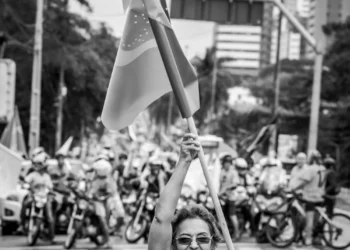by Conrado Pires de Castro
Translated and reviewed by Matheus Lucas Hebling
Framing sets the boundaries of analysis for policy choices. Framing is a process that determines how problems are defined, causes are explained, and policy responses and priorities are justified. Framing shapes narratives that can have a powerful effect in shaping policy choices concerning priorities for the allocation of resources, policy reforms, and mobilizing support for the implementation of policies.
Sakiko Fukuda-Parr. From the MDG to the SDG, 2016.
The realization that “poverty is defined in a thousand ways” (Geremek, B. [2004]: 214) in no way facilitates the challenge of eradicating “poverty in all its forms, in all places”, proposed in the opening of the Sustainable Development Goals (SDG1). Not only because poverty inhabits different places and bodies, each one with different sociocultural, geographical, and historically variable dimensions and meanings. But, essentially, through the recognition that the political, conceptual, and propositional definition of a new agenda for development and international cooperation proposed in the Sustainable Development Goals (SDGs) entails a long process of decades of diplomatic negotiations within the United Nations Organization. A process full of comings and goings, associated with the complex and profound transformations of the international scene, admitting different, if not divergent, interpretations and readings.
The first point to be highlighted, therefore, is the close relationship between the different evidence of the deepening of the crises observed in the ecological and economic dimensions in the final moments of the “golden years” of organized capitalism in the second half of the 20th century. From a strictly historical and factual perspective, the correspondences in the simultaneous emergence of manifestations of environmental awareness and the fractures of the Fordist model of regulation amid all sorts of questioning of the social, political, economic, and cultural institutionality inherited from the post-war period are sensitive (Mccormick, 1992). Not by chance, the consolidation of understanding regarding this new agenda for social and environmental development took place amidst the rise of neoliberal policies throughout the 1980s and 1990s.
This fact can be easily perceived in the parallel, almost overlapping, debates of the Brundtland Commission (1983-87) and the Uruguay Round (1986-94), or, more recently, the Johannesburg Summit (2002) and the Rio +20 (2012) and the Doha Round (2001-?). On the one hand, concerned with the reorganization of international cooperation mechanisms, to reconcile the confrontation of environmental issues with the challenge of reducing poverty on a global scale, and on the other hand, dealing with the reordering of trade regulation structures global, to unlock the chains to the development of a new international economic order.
And here we are faced with a tangle of meanings and meanings, showing the unpredictable and open nature of political disputes. After all, if contemporary economic neoliberalism is made up of elective affinities between the blind belief in the free market and the adoption of points of view from nineteenth-century political conservatism, its resigned accommodation to the selective winds of the modernization of social relations opens gaps for the deepening of tensions that make possible the elaboration of alternative responses consistent with expectations of more or less daring reforms, capable of strengthening radically more democratic and inclusive political constructions.
From time to time, we see evidence of these alternatives emerging in declarations of principles, action plans, and goals dealt with in successive UN thematic conferences. The exact twenty years that separate the Stockholm Conference on the human environment from the Earth Summit or Eco-92, held in Rio de Janeiro in 1992, witness the shift from emphasis to technocratic solutions of financial assistance and technology transfer as combat instruments to the “serious problems” of “environmental deficiencies” motivated by “underdevelopment conditions” (Stockholm Declaration, Principle 9) to “concerns with sustainable development” centered on “human beings” and guarantees of “a healthy and productive life, in harmony with nature”, which open the Declaration of Rio de Janeiro (Principle 1).
The idea of sustainable development discussed at Eco-92 had “as an indispensable requirement” the call for everyone’s cooperation ” in the essential task” of eradicating poverty, reducing “disparities in living standards” to “better meet the needs of the majority of the world’s population” (Principle 5). This spirit of “new levels of cooperation between States, key sectors of society and individuals”, was supported by the recurring call for broad “public participation” in decision-making processes, ensured, facilitated, and encouraged by States (Principle 10), recognizing in this dynamic the “fundamental role” played by women, by the creative daring of young people and by indigenous populations and their communities “in the management of the environment” and in the “promotion of sustainable development” (Principles 20 to 22).
The principles of the Rio Declaration were at the base of the action program for sustainable development contained in Agenda 21, agreed upon at Eco-92, and which would become the cornerstone of all subsequent proposals in this regard. In the third chapter of this document, the complex and multidimensional nature of poverty is recorded, requiring specific programs and interstate commitments to create an international environment to support national efforts to combat extreme poverty and hunger, to promote greater equity in the distribution income and expanding opportunities to earn a living sustainably, reaching all people (Agenda 21, § 3.1 and § 3.3).
Ideal equivalents are recognizable in all United Nations meetings and declarations related to the promotion of global development agendas – from Agenda 21 to the Millennium Agenda, passing through “Rio+10” (Johannesburg, 2002) and “Rio+20” ( Rio de Janeiro, 2012) -, as clearly expressed in the pages of the foundational text of the Sustainable Development Goals, Transforming Our World: The 2030 Agenda for Sustainable Development (ADS 2030):
11. We reaffirm the outcomes of all major United Nations conferences and summits that have laid a solid foundation for sustainable development and helped to shape the new Agenda. (…)
12. We reaffirm all the principles of the Rio Declaration on Environment and Development, including, inter alia, the principle of common but differentiated responsibilities… (ADS 2030)
Although inspired by the Millennium Development Goals (ADS 2030, § 16), their New Agenda differs not only in the number of goals and targets contained in the Sustainable Development Goals, but mainly “in their very purpose, conception, and the political process that flock their elaboration “. (Fukuda-Parr, 2016: 44). While the MDGs sought to develop a new logic of international aid in the context of neoliberal globalization, aimed at alleviating extreme poverty – understood as meeting basic needs -, and conceived technocratically within the international bureaucracy of the UN, the SDGs envision the potential for policies of sustainable development, rescuing something of the spirit of Rio-92. The greater scope and cohesion of the SDGs come from the fact that their purposes and goals are based ” on complex concepts and the quality development processes such as ‘ sustainability ‘ and ‘ inclusion ‘, rather than tangible and measurable outcomes “. (Same: 49)
It is precisely at this point that the question arises of the centrality of poverty eradication and special attention to the poorest and most vulnerable, as a “global challenge” and “an indispensable requirement for sustainable development” (ADS 2030, § 2). The SDG1 of “eradicating poverty in all its forms, everywhere” is structured on three main fronts: 1. General definition and another specifically national definition of poverty, 2. Adoption of socio-environmental protection mechanisms and 3. The conception of mechanisms funding and a solid political framework to support accelerated investments in actions to combat poverty. It is here that the “complexity of concepts” and the “qualities of the development process” reveal themselves to be sources of contradiction and tensions between more or less irreconcilable visions, derived from competing interests, taking “into account the different realities, capacities, and levels of development” global, regional and local (ADS 2030, § 5). This brings us to two final considerations.
As Arturo Escobar noted, it is necessary to pay attention to how poverty operates as an organizing concept and object of political framing – that is, how it “creates new discourses and practices that shape the reality to which they refer” (Escobar, 2014: 72). Current usage, also present in the general definition of poverty in SDG1 (goal 1.1.), is to establish a poverty line through minimum income limits (in this case, U$ 1.25 a day), and which, conceived in these terms.
There are variants in which the minimum income is calculated on a per capita basis, its solution may be rooted in mere economic growth, converted into a powerful instrument for standardizing the world. Alternatively, a vision that conceives the multidimensionality of poverty, according to different national and regional realities of needs and shortages (goal 1.2.), requires broader coping mechanisms, including the support of more robust social and environmental protection systems than the liberal and neoliberal development economic policies – or, perhaps, different reformist currents, as attested by the mirages of neodevelopmentalism neoextractivism in the global south – are capable of admitting (targets 1.3 to 1.5.). Hence, the tensions that manifest themselves in the difficulties of reconciling financing mechanisms for social and socio-environmental protection systems and the investments required for economic development, within certain political frameworks and their more or less unstable short and medium-term conjunctures.
There is, therefore, an ambivalence in the meaning given to poverty – extending to the notions of development and sustainability – which affects, if not even compromises, the consistent formulation of integrated strategies for social, economic, and environmental development: “the eradication of poverty” is the desirable outcome of a successful development process, or “an essential requirement” for sustainable development? Thus, according to Francine Mestrum, two questions remain echoing unanswered: “First, if sustainability is the concept that allows for an environmental dimension to be added to the existing development project, how does this additional concern affect the political, economic, social, and cultural dimensions of development? Second, are there any special links between the ecological dimension of development and poverty that can explain the ambivalent position of poverty, both as a dependent and as an independent variable of development?” (Mestrum, 2005: 44)
These are some of the issues that require the mobilization of our academic and scientific attention as well as our reflection and political action. The answers, however, await the pages of a story yet to be written.
References
ESCOBAR, Arturo. (2014). The invention of development. 2nd Edition. Popayán: Universidad del Cauca.
FUKUDA-PARR, Sakiko. (2013) Delivering the vision of the Millennium Declaration. In: OECD (2013), Development Co-operation Report 2013: Ending Poverty, OECD Publishing, p. 123-130.
FUKUDA-PARR, Sakiko. (2016) From the Millennium Development Goals to the Sustainable Development Goals: shifts in Purpose, concept, and Politics of global goal setting for Development. In: Gender & Development, vol. 24, No. 1, 43–52.
GEREMEK, Bronislaw (1984). Poverty. In: Einaudi Encyclopedia, volume 38 (Society – Civilization). Porto: IN/CM, p.213-244.
MCCORMICK, John. Towards Paradise: The History of the Environmentalist Movement. Rio de Janeiro: Relume Dumara , 1992.
MESTRUM, Francine. (2005) Poverty reduction and sustainable development. In: HENS, L. & NATH, B. (org.) The World Summit on Sustainable Development. The Johannesburg Conference. Netherlands: Springer, p. 35-55.
NHAMO, G.; TOGO, M. & DUBE, K. (2021) Making Sustainable Development Goals Relevant for, in and with Societies. In: NHAMO, G.; Togo, M. & DUBE, K. (ed.) Sustainable Development Goals for Society, Vol. 1: Selected topics of global relevance. Switzerland : Springer, p. 3-18
Castro, Conrado Pires de. 2023. "Poverty Eradication, what a challenge!". Brazilian Research and Studies Blog. ISSN 2701-4924. Vol. 3 Num. 1. Available at: https://www.bras-center.com/poverty-eradication-what-a-challenge/, accessed on: February 1, 2026.







